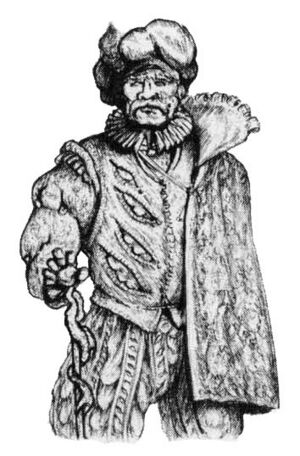Handrich

Money, power, and influence—these are my Gods. And Handrich represents all that is money, power, and influence. BIANKA GRUTZNER, HEIRESS TO THE GRUTZNER DRY GOODS CONSORTIUM, ALTDORF
Handrich (also known as Haendryk and called Mercutio in Tilea) is a minor God popular with traders, merchants, burghers, and others involved in making a profit through business dealings. Although most peasants consider all business folk to be swindlers, cultists of Handrich are more concerned with prosperity for all through commerce — what benefits the merchant often benefits those around him as well.
Outside of Marienburg, where the cult is based and is the strongest, many people confuse Handrich with an aspect of Ranald known as "The Dealer." For those in the know, however, the distinction is clear — Handrich is the God of legitimate business, while thieves, smugglers, and conmen worship Ranald, though there are many examples on both sides of this not necessarily being true. The two cults have created a healthy sense of competition between them, and, so far, it has not erupted into violence, though theft, backroom dealings, and other dirty tricks are considered fair game between the two.
Handrich is depicted as a contented and jovial figure who delights in both the acquisition of wealth and the spending of it. He is the consummate seller — charismatic, smooth, and likable, and seems to view his cultists not so much as mere worshippers, but as business partners. Handrich is shrewd in his dealings and expects his cultists to be smarter and faster than the people they deal with. Cultists believe Handrich watches every transaction and business dealing. Building charitable works is also highly encouraged, though often with some secondary purpose, such as a tax shelter or means of avoiding inspection of goods.
On the negative side, Handrich is both greedy and manipulative, exhorting the belief that the ends justify the means. In Handrich's eyes, if you make a profit from someone else's stupidity or ignorance, then that's coin better spent on better ventures. Cultists are encouraged to put up this double standard of presenting a respectable face to the public, while fleecing them with fixed prices and false shortages.